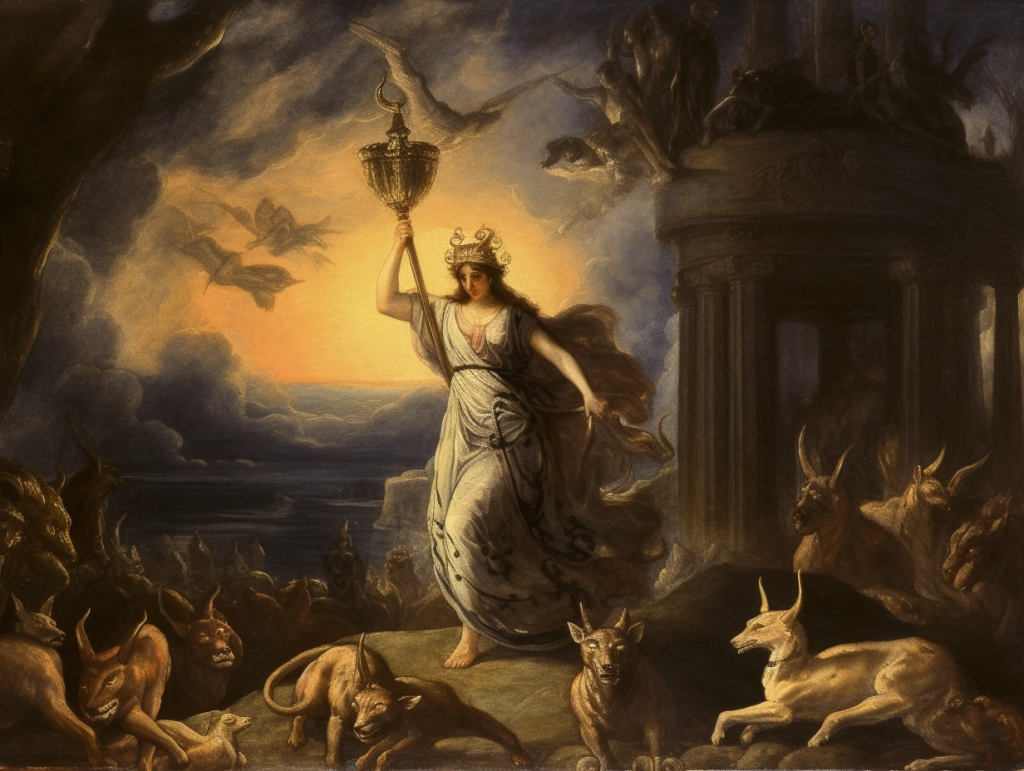Are you curious about the prophecies and insights of Cassandra in Greek mythology?
Delve into the tragic story of this prophetic figure and unravel the nature of her unique gift. Despite her knowledge of future events, Cassandra was cursed with unbelief, leading to her plight in Greek mythology.
Explore how her insights into fate shaped Greek tragedy and discover the valuable lessons we can learn from the intersection of prophecy and destiny.
Get ready for a journey into the world of Cassandra’s prophecies and Greek mythological fate.
Key Takeaways
- Cassandra’s prophecies were often cryptic and ambiguous, providing glimpses into the future and offering warnings and insight.
- Despite her accurate predictions, Cassandra was dismissed as a madwoman and her warnings went unheard, serving as a cautionary tale about the dangers of disbelief.
- Cassandra’s gift of prophecy became a curse as she was powerless to alter the course of events, raising questions about the role of free will in the face of an inevitable fate.
- Foreknowledge does not equate to control, highlighting the limitations of knowing the future and the importance of accepting one’s destiny.
The Myth of Cassandra: A Tragic Prophetic Figure
You should explore the myth of Cassandra, a tragically prophetic figure. In Greek mythology, Cassandra was blessed with the gift of prophecy by the god Apollo. However, her ability came with a cruel twist. Despite her accurate predictions, no one believed her. Cassandra’s words were dismissed, and her warnings went unheard. This lack of belief and understanding led to her ultimate tragedy.
Cassandra’s story serves as a cautionary tale about the consequences of not heeding the truth. Her gift of prophecy, although a blessing, became a curse as she was doomed to live a life of frustration and despair. Imagine possessing the knowledge of impending doom, yet being powerless to prevent it. Cassandra’s fate highlights the importance of open-mindedness and the dangers of ignorance.
Cassandra’s gift: unraveling the nature of prophecy holds profound significance. By delving into her story, we can gain insights into the complexities of prophecy and the human desire to control our fate. It forces us to question our beliefs and confront the uncomfortable truth that our future mightn’t be within our control. Cassandra’s myth challenges us to seek knowledge, to listen to those who possess wisdom, and to acknowledge the power of prophecy in shaping our destiny.
Cassandra’s Gift: Unraveling the Nature of Prophecy
Delve into the nature of prophecy by unraveling Cassandra’s gift and exploring its complexities and implications. Cassandra, the tragic prophetess of Greek mythology, possessed a unique ability to see into the future. However, her gift came with a heavy burden – a curse that ensured her prophecies would never be believed. Despite her knowledge of impending disasters, Cassandra was powerless to prevent them, forever trapped in a cycle of futility.
To better understand the nature of Cassandra’s gift, let us examine its complexities and implications in the following table:
| Complexity | Implication |
|---|---|
| Cassandra’s prophecies were always accurate | The accuracy of her predictions highlighted the cruel irony of her curse |
| Her prophecies were often cryptic and ambiguous | This made it difficult for others to comprehend and accept her warnings |
| Cassandra’s gift was a result of a curse from the god Apollo | This divine origin added a layer of mystery and divine significance to her prophecies |
| Her inability to alter the course of events created a sense of powerlessness | Cassandra’s gift became a burden, as she was condemned to witness the tragedies that she foretold |
| Cassandra’s gift was a double-edged sword | While it gave her insight into the future, it also brought isolation and despair |
Unraveling the complexities of Cassandra’s gift allows us to appreciate the immense power and tragedy inherent in prophecy. However, it also raises important questions about the limitations of foreknowledge and the freedom to change one’s destiny.
Transitioning into the subsequent section about ‘the curse of unbelief: Cassandra’s plight in Greek mythology’, we will explore the devastating consequences of Cassandra’s inability to be believed, and the impact it had on her life and the world around her.
The Curse of Unbelief: Cassandra’s Plight in Greek Mythology
Cassandra’s curse of unbelief was a relentless torment that overshadowed every aspect of your life. As a freedom-seeking individual, you can’t help but empathize with her plight. Imagine being blessed with the gift of prophecy, only to be cursed with the inability to convince anyone of your visions. It’s a cruel fate indeed.
In Greek mythology, Cassandra was granted the ability to see the future by the god Apollo. However, when she rejected his advances, he placed a curse on her. From that moment on, Cassandra’s prophecies were met with disbelief. No matter how dire the warnings or how accurate the predictions, she was dismissed as a madwoman.
This curse of unbelief caused Cassandra immense frustration and despair. She could see the impending doom, the tragedies waiting to unfold, but she was powerless to change the course of events. Her words fell on deaf ears, and her pleas for action went unanswered.
Imagine the anguish of knowing what lies ahead, yet being ignored and ridiculed. Cassandra’s curse serves as a cautionary tale about the dangers of disbelief and the consequences it can bring. It reminds us to listen, to trust, and to never underestimate the power of someone’s insights, no matter how unconventional they may seem.
The Power of Fate: How Cassandra’s Insights Shaped Greek Tragedy
With both a deep understanding of the future and an unwavering belief in the inevitable, Cassandra’s insights shaped Greek tragedy in profound ways. Her ability to see the fated outcomes before they unfolded gave her a unique perspective that greatly influenced the course of Greek mythology. Here is how Cassandra’s insights shaped Greek tragedy:
- Foreknowledge of Tragedy: Cassandra’s prophecies often revealed the tragic events that would befall the characters in Greek mythology. Her foresight allowed the audience to anticipate the tragic outcomes, creating a sense of suspense and dramatic irony.
- Catalyst for Conflict: Cassandra’s prophecies, despite being accurate, were often met with disbelief and rejection. This disbelief became a source of conflict, driving the narrative forward and intensifying the tragedy. Cassandra’s insights acted as a catalyst for the conflicts that unfolded in Greek tragedies.
- Exploration of Free Will vs. Fate: Cassandra’s prophecies raised questions about the role of free will in the face of an inevitable fate. Greek tragedies often explored the tension between characters’ choices and the predetermined outcomes predicted by Cassandra, adding depth and complexity to the stories.
- Reflection of Human Hubris: Cassandra’s insights served as a reflection of human hubris, highlighting the consequences of arrogance and ignorance. The tragic heroes’ refusal to believe Cassandra’s prophecies demonstrated their flawed nature and their eventual downfall.
Cassandra’s profound insights into the future gave Greek tragedy a sense of inevitability, conflict, and moral introspection. Her influence continues to shape the way we understand and appreciate these timeless stories of fate and human nature.
Lessons From Cassandra: Exploring the Intersection of Prophecy and Destiny
As you explore Cassandra’s prophecies and insights, you will discover the fascinating intersection of prophecy and destiny. Cassandra, blessed with the gift of prophecy but cursed with the burden of never being believed, offers valuable lessons about the delicate balance between knowing the future and shaping one’s own destiny.
In Greek mythology, prophecy and destiny are intertwined, creating a complex web of possibilities and limitations. Cassandra’s prophecies serve as a stark reminder that foreknowledge does not equate to control. Her tragic fate demonstrates that even when armed with the knowledge of what lies ahead, one cannot always alter the course of events.
To understand the lessons from Cassandra, let’s explore the intersection of prophecy and destiny through the following table:
| Prophecy | Destiny |
|---|---|
| Reveals what may come to pass | Represents the predetermined course of events |
| Offers insight and warnings | Implies a lack of free will |
| Can empower individuals to prepare | Can create a fatalistic mindset |
| Challenges the idea of agency | Raises questions about the nature of choice |
| Highlights the importance of acceptance | Encourages individuals to embrace their fate |
Through Cassandra’s story, we learn that while prophecy may provide glimpses into the future, our destinies ultimately lie in our own hands. We have the power to shape our actions and make choices that can defy even the most foretold outcomes. The lessons from Cassandra remind us that, despite the constraints of fate, we are free to navigate our own paths and create our own destinies.







